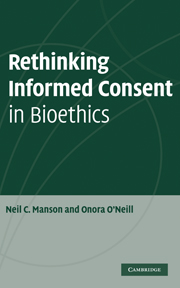Book contents
- Frontmatter
- Contents
- Preface
- Acknowledgements
- 1 Consent: Nuremberg, Helsinki and beyond
- 2 Information and communication: the drift from agency
- 3 Informing and communicating: back to agency
- 4 How to rethink informed consent
- 5 Informational privacy and data protection
- 6 Genetic information and genetic exceptionalism
- 7 Trust, accountability and transparency
- Some conclusions and proposals
- Bibliography
- Institutional sources and documents
- Index
2 - Information and communication: the drift from agency
Published online by Cambridge University Press: 05 June 2012
- Frontmatter
- Contents
- Preface
- Acknowledgements
- 1 Consent: Nuremberg, Helsinki and beyond
- 2 Information and communication: the drift from agency
- 3 Informing and communicating: back to agency
- 4 How to rethink informed consent
- 5 Informational privacy and data protection
- 6 Genetic information and genetic exceptionalism
- 7 Trust, accountability and transparency
- Some conclusions and proposals
- Bibliography
- Institutional sources and documents
- Index
Summary
We have argued that current thinking about informed consent is problematic, and that we need to rethink the part that it can play in biomedical practice. But how exactly should we go about this? One approach would be to focus first on the underlying ethical justifications for such demanding consent requirements. We might, for example, raise questions about the coherence of putting so much weight on respect for individual autonomy in biomedical ethics. Or we might, if we were of a consequentialist bent, focus on the costs and implications of current informed consent procedures and argue that in certain cases their costs outweigh their benefits.
Our preferred, rather more radical, approach is to expose ways in which current thinking about informed consent rests upon a distorted conception of the nature and significance of information and communication. In fact, we shall argue, there are two different kinds of distortion implicit in current thinking about informed consent. One distortion derives from reliance on autonomy-based justifications for informed consent; we postpone discussion of these issues until Chapter 4. The second, more general distortion derives from the metaphorical framework that we use to think and talk about information and communication. Contemporary thinking about information hides and downplays many important aspects of communication and information, including the fact that communicating and informing are types of action and interaction, so depend on a normative framework against which such action succeeds or fails.
- Type
- Chapter
- Information
- Rethinking Informed Consent in Bioethics , pp. 26 - 49Publisher: Cambridge University PressPrint publication year: 2007

